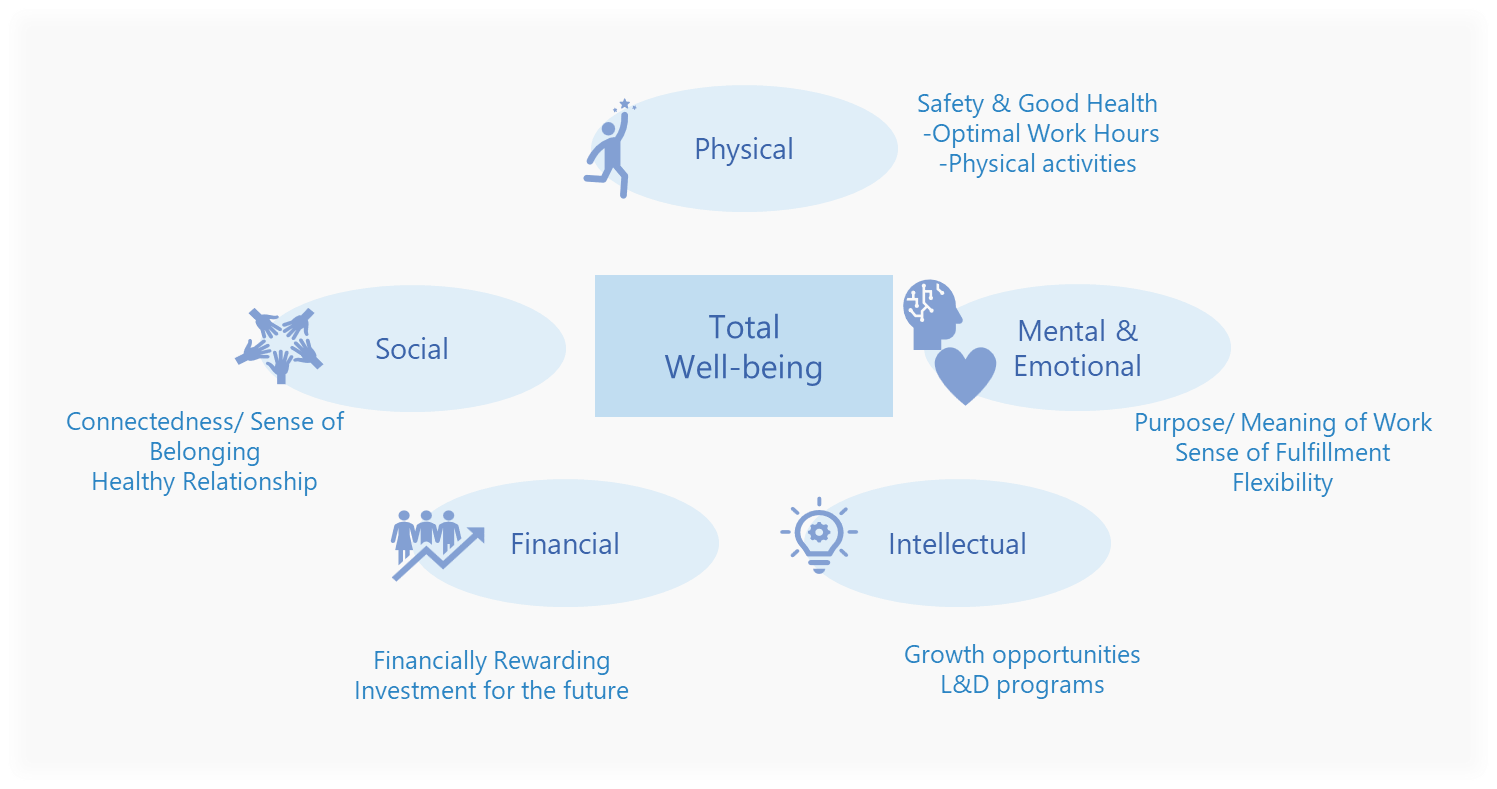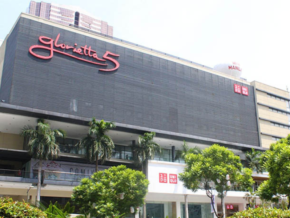Social Aspect of ESG: Fostering Employee Well-Being in the Workplace
The “Social” category of ESG pertains to how the company interacts with and impacts people around its circle of influence – both internally and externally. While there is a wide array of social issues such as labor relations, diversity, equity, inclusion and belongingness, protection of human rights, well-being and community engagement, this article will focus on the topic of employee well-being and how organizations can foster a safe, healthy working environment for employees.
The World Health Organization (WHO) defines well-being as when “people flourish and achieve their full physical and mental health potential throughout their lives and across generations.”
 IMAGE from Pexels
IMAGE from Pexels
Why is it important?
Harvard Business Review (2021) argues that improvements in worker well-being programs can bring about positive business outcomes such as increased productivity, higher individual and organization performance and reduction in cases of employee burnout.
According to the Gallup Global Workplace Report for 2023, 68% of employees in Southeast Asia are not engaged (classified as “quiet quitting”) or not actively contributing to the growth and development of the organization. They deliver the bare minimum requirement. Moreover, the Philippines ranked 1st for being most stressed among Southeast Asian employees. In the same study, Gallup reported that low employee engagement costs the global economy $7.8 trillion, hindering growth potential for businesses.
To unlock employees’ potential and drive optimal performance, more and more leaders recognize the importance of addressing employee well-being issues to drive overall organizational performance. Prioritizing well-being tends to produce more engaged and motivated employees, who contribute positively to the organization.
How can organizations foster employee well-being?
In the 2023 JCCIPI Wage Survey, NRI Manila reported that 34% of its respondents indicated ‘Employee Wellness’ as one of the top programs that drive motivation and retention of employees.
The growing conversation on sustainability and employee well-being represents a profound transformation in business leaders’ appreciation of the workforce. From the human capital perspective where employees are viewed as mere “assets” to be maximized, to treating them as “stakeholders”, whose health, happiness, and engagement are pivotal in driving long-term business success.
In the topic of employee well-being, what sets a surviving versus a thriving organization is how business leaders can shift their mindset and perspective on the following paradigm.
Work vs. Life
Much has been said about the benefits of work-life balance – as if work and life are two opposing concepts that need to be weighed and equally valued. However, the pandemic has changed the conversations on work-life balance. Employees are no longer seeking to find balance between work and life – they have come to the realization that work is indeed just a part of life.
NRI’s Total Well-being Framework shows how employees traverse these five (5) domains as they improve their quality of life. As companies promote a workplace environment that supports holistic development, organizations create a more positive employee experience and improve quality of life for employees, resulting to increased job satisfaction, higher productivity, and a more resilient workforce.
For a Better Employee Experience (EX) and Quality of Life (QOL)
 IMAGE from NRI Manila
IMAGE from NRI Manila
Employee training and development has expanded from knowledge and skills building to overall talent development. Unilab, Inc., the country’s leading healthcare company has launched its “Life Matters” program which covers all these five domains with initiatives from financial literacy for young/new to workforce employees to retiring employees, to employee-led advocacy programs under the banner program “Alagang Unilab” (care for community). This program created a shared value between management and its employees standing in unity to serve its communities and various stakeholders.
Appreciation for the holistic development of employees can be seen in the evolving regulations and initiatives in the country. DOLE (Department of Labor and Employment) mandated workplaces to implement mental health programs to support employee welfare and well-being (Rappler, 2022). This policy aims to raise awareness and provide access to support for Filipino workers with mental health issues. The Department of Health (DOH) sponsored by the World Health Organization (WHO) and Australian government also launched “The Wellness Movement” for Filipino healthcare workers nationwide in January 2023.
On average, 54% of Filipino workers experience a decline in their well-being, and a substantial 10% of the workforce is currently grappling with mental health crises. Among industries, those in the knowledge-based sectors – specifically IT, Finance, Media and Advertising, and Utilities – are facing greater wellness issues (Rappler, 2022).
Given this context, many companies integrate wellness programs that encourage healthy behaviors among employees. These programs not only enhance well-being but can also reduce healthcare costs and absenteeism, contributing to sustainability by optimizing resource allocation. Conglomerates in the Philippines such as Ayala, Aboitiz, Unilab, etc. have established a comprehensive Employee Assistance Program (EAP), providing employees with access to 24/7 mental health support. While utilization rate is quite low, the future of EAP is to “function as an enabler of a holistic culture of wellness by supporting intersectional needs such as nutrition, rest, and mindfulness. What companies can take away is that mental health is for everyone, and that means meeting everyone’s special needs the way that they can best adapt to them” (Rappler, 2022).
Today, the discourse on employee well-being has expanded beyond physical well-being to a more holistic perspective including physical, emotional, financial, social, career, community, and purpose. At the heart of this is the growing need for flexibility in where, when, and how employees work.
Track vs. Trust
Flexible work arrangements took center stage due to lockdowns during the pandemic. Suddenly, workplaces had to adapt to an online (work from anywhere, anytime work environment). While most companies have started to Return to Office (RTO), majority have experienced the benefits of a hybrid setup and are looking to carry this on for the long-term.
In the 2023 JCCIPI Wage Survey, NRI Manila reported that out of 221 respondents, 35% are implementing flexible work arrangements in terms of working hours and / or location. With the flexible work arrangements, companies view of “attendance” and absenteeism needs to be revisited.
The primary goal of leaders is to enhance the performance of their teams. Historically, measuring productivity has been challenging, and one straightforward method has been to assess employees’ presence in the office. However, being physically present at the workplace does not necessarily correspond to being productive, especially in today’s environment where employees are often located in various geographic locations.
In NRI Manila’s 2023 HR Global Outlook Report, it was stated that instead of monitoring whether work is done, it is more crucial to ask HOW work is done.
- Trusting systems aspire to establish norms, where leaders gather feedback from employees and align on when to meet – both for work or for establishing connection among work colleagues, and how best to communicate.
- Trusting systems cultivate openness and communication. Companies have formalized regular check-ins between immediate superior and employees allowing for more frequent dialogue, and not waiting for the next performance cycle to conduct coaching and mentoring. Interestingly, setting regular check-ins that do not talk about work, tend to get more work done (Indeed, 2022).
- Trusting systems ensure healthy practices that protect employees’ well-being such as taking breaks and regularly getting up to move around. At the end of the day, employees care for the company that cares for them the most.
In the 2022 Work Trend Index, Microsoft talked about the “worth-it equation” – what people want from work and what they are willing to give in return.
Recent trends on employee well-being shows that as companies invest in holistic development and go beyond the transactional bounds of the employment contract, employees likewise extend themselves outside of what is bare minimum expectation from their work. This unleashes “discretionary effort”. It is imperative to recognize that employees’ discretionary effort is not just a valuable asset but a driving force behind organizational sustainability. When employees willingly go the extra mile, they propel the organization forward. In fostering an environment where employees are inspired to give their best, organizations pave the way for enduring success, where sustainability becomes a collective journey ensuring long-term wins for both the employer and the employee.
NRI Manila supports companies in the area of Sustainability and ESG through our sustainability consulting services. We support companies in developing their sustainability strategies in terms of corporate culture, structure, assessment, and reporting to achieve a more sustainable future.
About the Contributor

Diane is the Head of the HR Sector at Nomura Research Institute Singapore Pte. Ltd. Manila branch. She has over a decade of experience in Human Resources and Organization Development helping organizations in their organizational transformation journeys. She is also a recipient of the prestigious Australia Awards Scholarship, where she earned her master’s degree in Human Resource Management and Industrial Relations from The University of Sydney.
REFERENCES:
2022 integrated report. Ayala Land Investor Relations. (2023, May 31). https://ir.ayalaland.com.ph/2022-integrated-report/
Aboitiz Equity Ventures Inc. (2023, June 14). Aboitiz 2022 Annual Integrated Report. https://sustainability.aboitiz.com/report/
https://hbr.org/2021/10/7-strategies-to-improve-your-employees-health-and-well-being
https://www.gallup.com/workplace/349484/state-of-the-global-workplace.aspx













